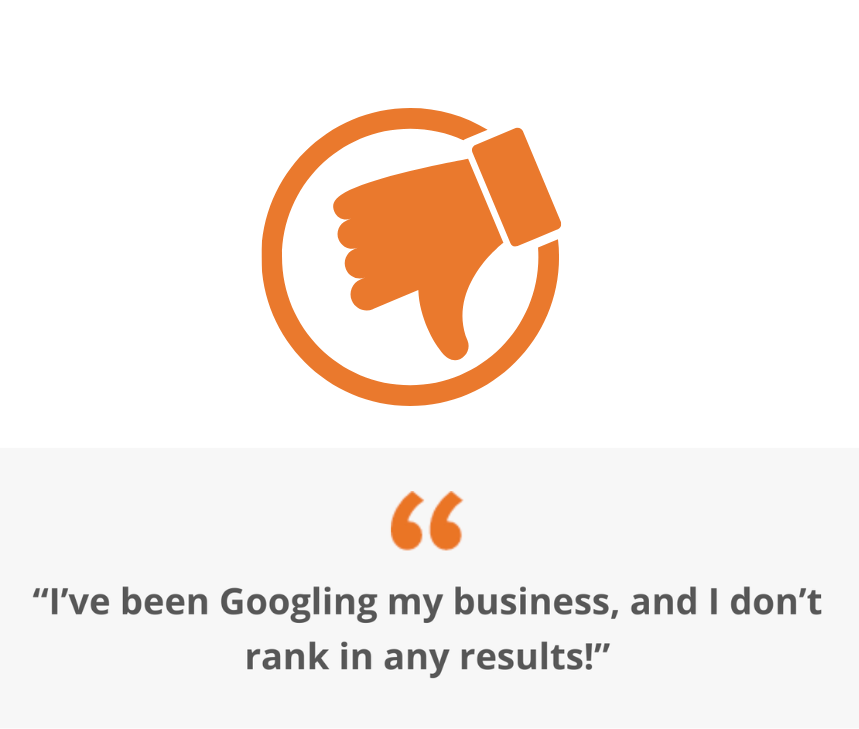We get it. It’s tempting to Google your business to see how your site is doing, and it may seem like a harmless thing to do, but it’s not a good idea, and we’ll explain why this is a futile and detrimental thing to put your website (and yourself) through.
Google is an ever-changing, omnipresence that puts every ounce of its existence into being the best search engine out there. On that premise, rest assured it has many in-depth, algorithm-based rules and preferences to determine your intent and it is a multi-faceted decision as to what to serve up to each search. (Not to mention that according to Google, these algorithms quite literally undergo some amount of change almost every day–talk about a moving target!)

Facts to Stop You from Googling Your Own Business
- If you Google your business name and it does come up, you’ve put yourself in a bad situation because any action you take next may send less than positive information back to Google regarding your site’s quality.
- You could inadvertently lower your own rank. If you Google yourself, see your website, and don’t click on it, you’ve just told Google that the result it showed you is not relevant for that search. Yikes! Let’s avoid that one.
- If you Google yourself, see your website, and want to avoid sending the wrong message to Google about relevancy, you could click on it. But unless you spend time on your website next and click to other pages (showing engagement), you are sending Google Analytics a bounced visit and pulling down your own website stats. Again, you may be telling Google that the site’s relevancy to your search wasn’t great.
- No two searches are the same. Chances are that there are literally hundreds (or in some cases even thousands) of keywords and phrases that are relevant to what you do/offer that people search for, and it’s nearly impossible to rank highly for all of them with a single page of content. Even the prevalence of voice search these days has altered how and what people search for. Your page may rank well for one term, but not for another, and a single Google search won’t show you this. Start making changes based on a single search term, and you may kill your organic performance on others.
- Two people searching the same word(s) may have completely different search results. While Google says they don’t necessarily “personalize” results in the way you might think, they do take into consideration the context and intent of the searcher. For example, Google knows that I’m located in Hutchinson, MN. It’s also figured out that I often search for businesses and places located here. So if I search for something in the future, I’m more likely to get results relevant to Hutchinson, MN than, say, Hutchinson, KS. Add to this the prevalence and weight of local search results, and what you see may differ quite a bit from that of your potential customer.
- If you are doing paid Google Ads, these scenarios also mess with your ad performance and can cost you money. Click on the ad, and you’ve charged your own account. Don’t click, and you’ve made your ad look less relevant to the machine learning algorithms, potentially lowering your quality score which can hinder performance and increase your costs. This is a losing scenario either way!
Worried About Your Rank? Try This Instead!
- Improve the user experience: Is your site something a user would find interesting? Useful? Relevant? If you took down all your content tomorrow, would anyone miss it? If you didn’t answer “yes” to these questions, this is likely the first place to focus your attention. Useful sites get visited more often. They get shared more often. They get linked to more often. And all of these actions are great for improving your organic ranking performance! Create content that people need and want to share.
- Track your overall organic traffic performance: There are free tools available, such as Google Analytics and Google Search Console, that can help you keep tabs on total organic traffic to your site, how you perform on certain organic search queries, etc. Make use of this data to find areas that are working well and areas for improvement, then monitor your stats to make sure things are going in the right direction as you make them better. Not sure how? Vivid Image clients should connect with their Account Directors to set up the metrics that matter to them and get any help needed to understand the results.
- Use a Rank Tracking tool: There are various versions of these available (most have monthly subscription fees to use them). Rank tracking tools allow you to monitor particular keywords and phrases and where your site’s average position is in organic search. You will quickly see that rankings can and do change some on a frequent basis, but the important thing is to watch over longer periods of time. (After all, SEO is a long-game strategy and improvements rarely happen in a short amount of time!) Patience is key. Again, this is a service we can offer to our clients interested in taking their online marketing to the next level. Please ask us!
- Get professional guidance: Work with an SEO professional who can help you focus on the day-to-day changes and improvements that can help keep your organic performance moving in the right direction rather than spinning your wheels on random Google searches.
Need Help Figuring Out How Your Site is Doing?
Use safe, reliable tools and proven processes to gain a quick, accurate snapshot of your website’s performance on Google. Our team will guide you in identifying and taking your next best step, tailored specifically to your goals.
